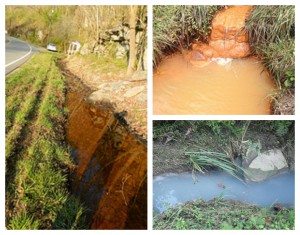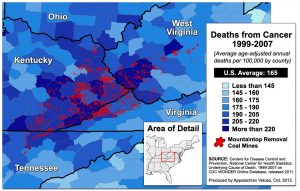Front Porch Blog
If the SOAR initiative is to go beyond political rhetoric, Rep. Hal Rogers and Gov. Steve Beshear must take public concerns about mountaintop removal’s health impacts seriously.

Water polluted by mining in eastern Kentucky. Photos by Appalachian Citizens Enforcement Project via Flickr.
I attended the first Shaping Our Appalachian Region (SOAR) Summit held in Pikeville, Ky., last December. Following Kentuckians For The Commonwealth’s Appalachia’s Bright Future economic development meeting, I was excited at the prospects such a large summit might generate.
As a joint effort between U.S. Representative Hal Rogers (R-Ky.) and Kentucky’s Democratic Governor Steve Beshear, it was clear that SOAR had the power to make real change in eastern Kentucky, but only if those involved had the will.
The results of SOAR following the summit have been mixed so far. Several people have pointed out issues with the process — specifically, the stakeholders most involved in SOAR may not accurately represent the needs and concerns of eastern Kentuckians. Since the summit, my hope for the outcomes of SOAR have waned. But when I learned that the director of the Centers for Disease Control and Prevention (CDC), Dr. Tom Frieden, would be visiting eastern Kentucky as part of the SOAR Health Impact Series, I saw an opportunity for the voices of residents from coal-impacted communities in eastern Kentucky counties to be heard.
Making a Clear Case on Mountaintop Removal and Health
Over the past several years, more than 20 peer-reviewed studies have been published linking a range of health problems including above-average cancer and birth defect rates to the presence of mountaintop removal coal mining. Yet just last month, the Obama administration pulled funding from the U.S. Geological Survey for research underway on air pollution from mountaintop removal and its link to respiratory issues. The need for a serious effort to identify and address health issues related to mountaintop removal in Central Appalachia has never been more clear. Despite this, I was not optimistic that Dr. Frieden and Rep. Rogers would address this need during their visit.

Studies investigating mountaintop removal health impacts have found people living near surface mining are 50 percent more likely to die of cancer.
Prior to the CDC visit, the SOAR health committee held 11 listening sessions across eastern Kentucky from April through July. Each of the sessions drew an average of more than 20 participants. Although SOAR has thus far limited the role of key community members in leadership positions, the health committee has provided a forum for some community involvement.
The CDC meetings consisted of four sessions — two shorter evening sessions in Somerset and Paintsville, and two longer daytime sessions in Hazard and Morehead. I attended the daytime session in Hazard last Tuesday, where there was standing room only. Several individuals spoke, including Rep. Rogers and several doctors from eastern Kentucky.
As the morning went on, I began to lose hope that environmental concerns would be brought up. Then, Dr. Nikki Stone, the health committee chair and event moderator, spoke about the issues that came up during the listening sessions. She began listing the top 10 concerns that had come up throughout the listening sessions, and much to my surprise, environmental impacts, including air and water pollution from mountaintop removal mines, was the top concern resulting from the listening sessions, tied with a desire for coordinate health programs in public schools.
To be honest, I was stunned. I was so sure that the topic would be avoided at a meeting that attracted so much attention. Suddenly, I was hopeful that the health impacts of mountaintop removal would receive some real attention from those that have the power to address the issue.
Unfortunately, the rest of the meeting quickly turned back to lengthy speeches about taking personal responsibility for one’s own health and an announcement of federal funding for the Appalachian Cancer Patient Navigation Project. The talks left me with the distinct impression that those speaking would rather focus on dealing with the prevalence of disease, rather than preventing it.
The Health Impact Series did not improve later that evening in Paintsville. The closest mention of environmental impacts on health came from Rep. Rogers, who referred to dirty streams but then went on to blame water quality degradation on people dumping and straight piping waste into streams. It seemed once again that it was easier to blame eastern Kentuckians, rather than the industry they have been beholden to for generations.
The Opportunity Ahead
There was a strong press presence at both meetings, which may have salvaged some chance of addressing the impacts of mountaintop removal. According to the Lexington Herald-Leader, when “asked whether he would support having the CDC study the public health effects of mountaintop mining in Central Appalachia, Frieden said the agency ‘only goes where it’s invited.’” Following the disappointing Paintsville meeting, I felt like I had one last opportunity to make the most of the meetings and approached Dr. Frieden fully expecting to be turned away. Instead, he listened carefully for a moment and then directed me to his assistant. I spoke with several CDC employees and was disappointed to find that they were unaware of the multitude of health studies linking health problems to mountaintop removal. They did, however, encourage me to contact them directly for follow up on the issue.
Moving forward, Appalachian Voices and our allies intend to follow up with the CDC, to be sure that they are fully aware of the current research that indicates quite clearly that one of the major health issues we should be concerned about in Central Appalachia is mountaintop removal coal mining. We will be sure that the CDC knows that, at least when it comes to the citizens of eastern Kentucky, the CDC is invited to investigate this pressing issue. We will also be sure that the SOAR Health Committee acts upon its finding that citizens are most concerned about environmental impacts on health, because, as the Herald-Leader stated, “when a congressman and governor invite people to ‘listening sessions,’ there’s an obligation to take what they say seriously.”
PREVIOUS
NEXT
Related News

Leave a comment
Your email address will not be published. Required fields are marked *
